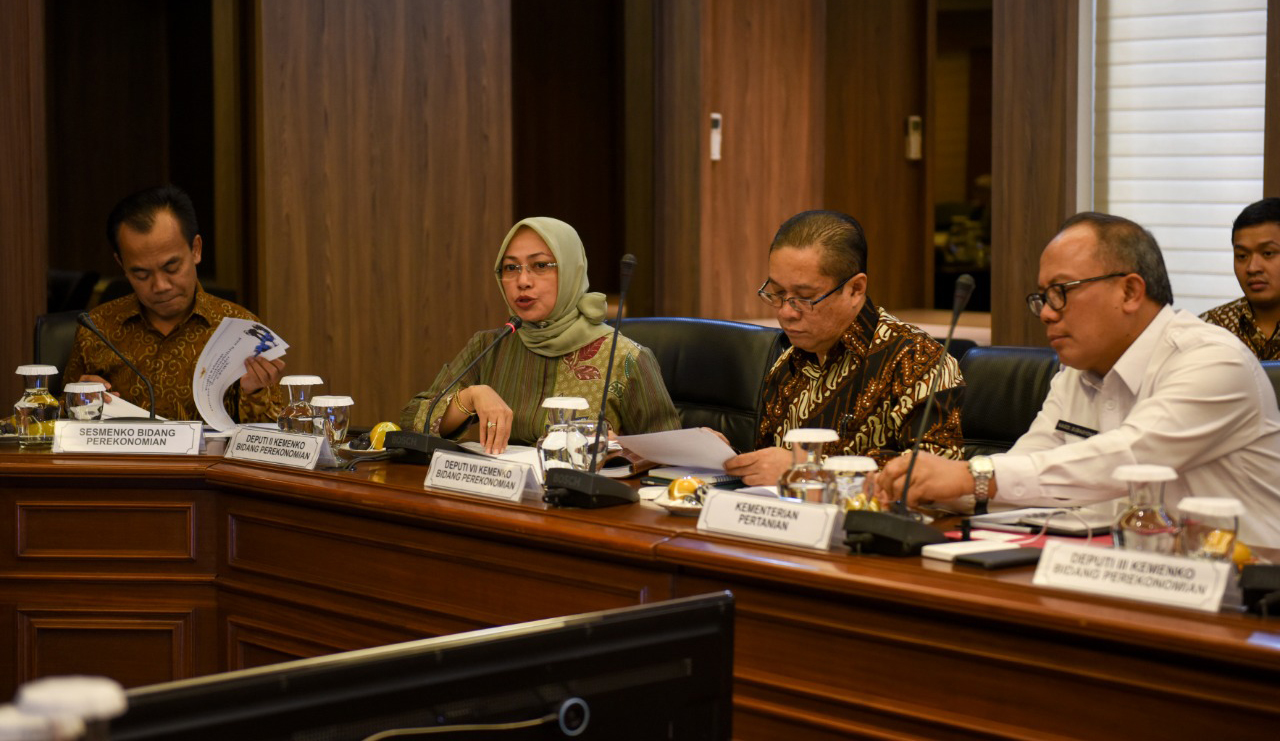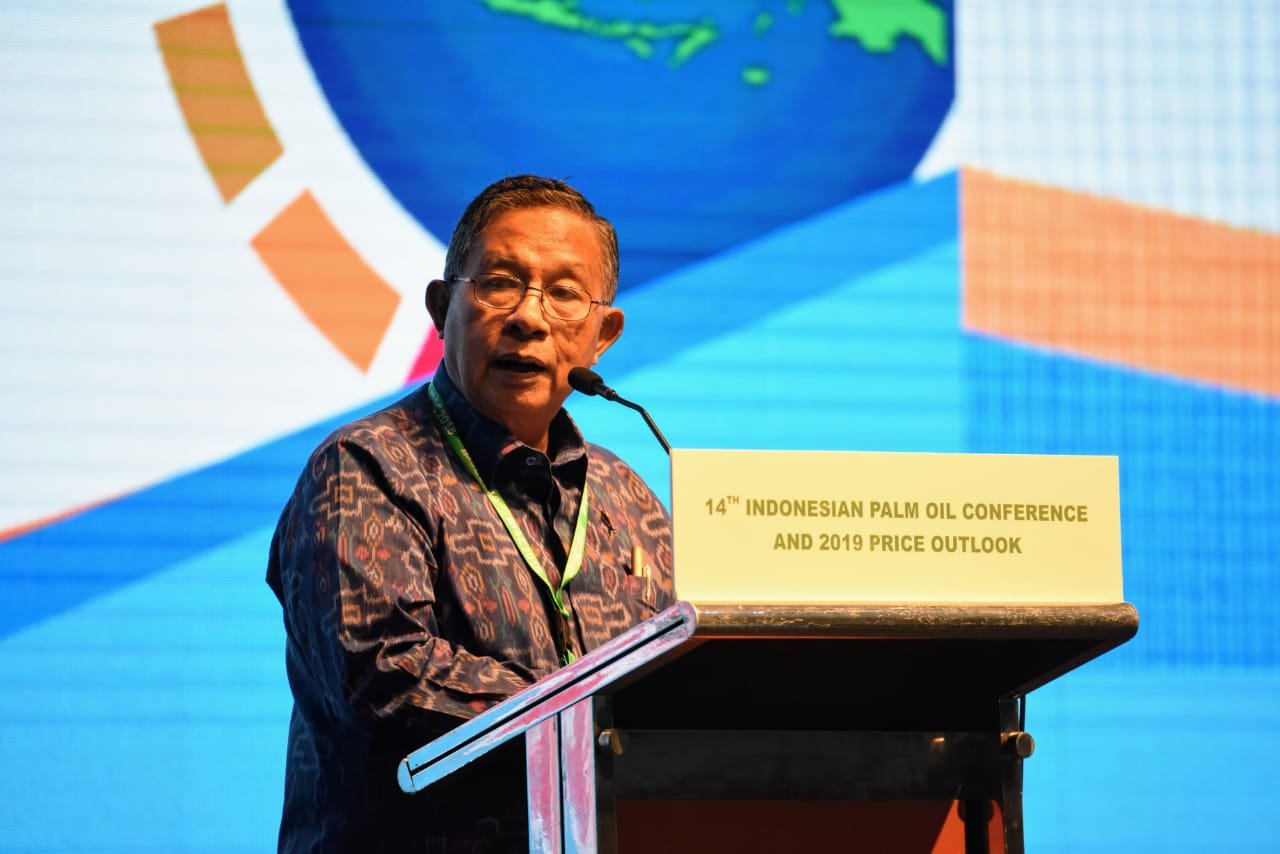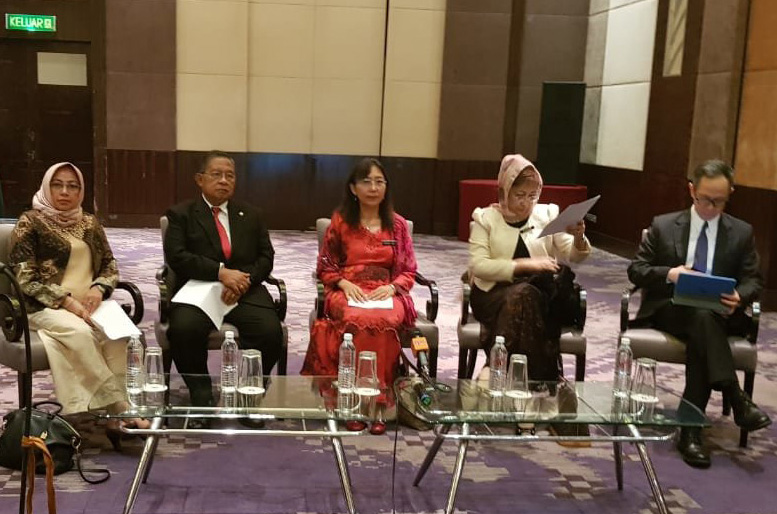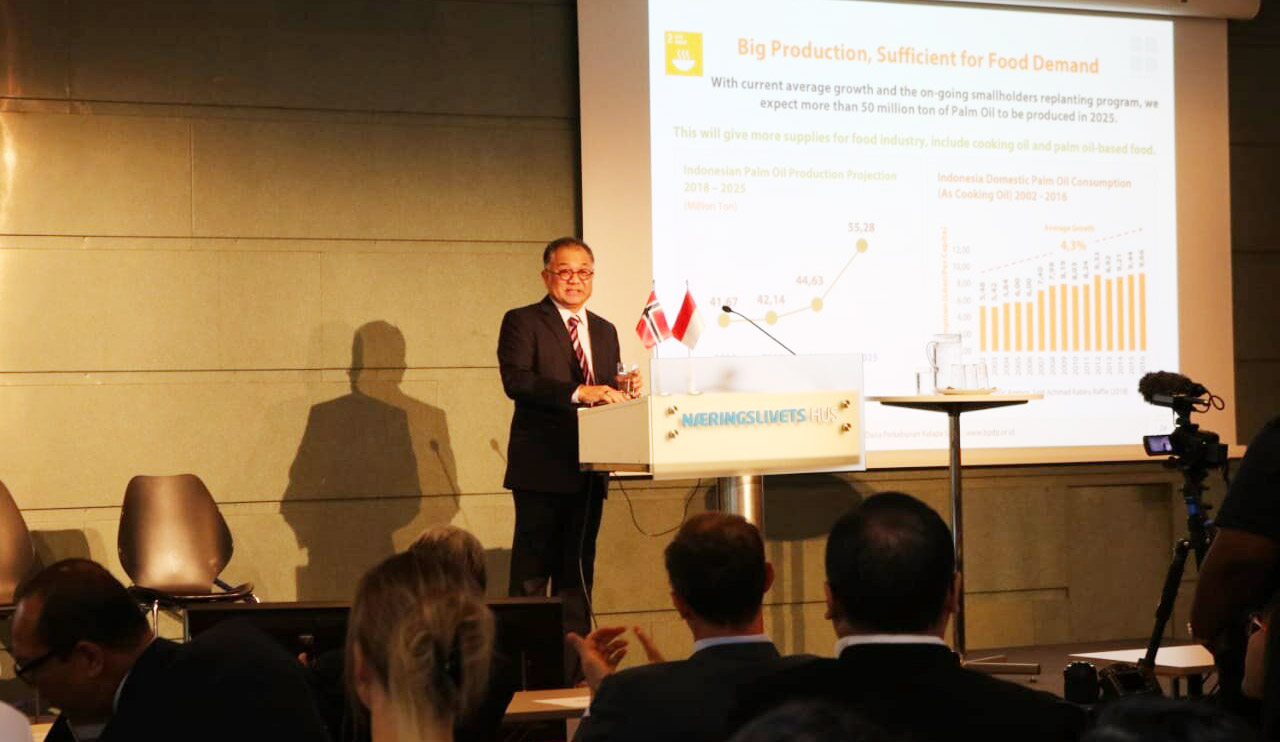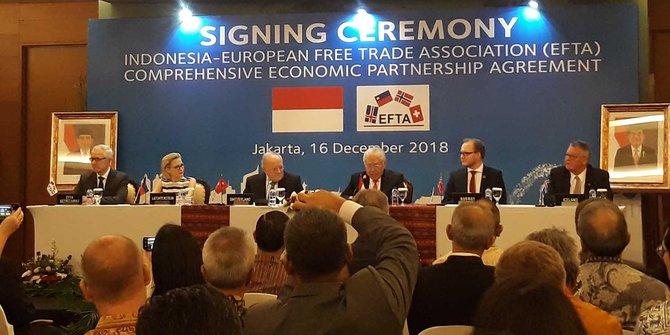BPDPKS Convinces Europeans of Palm Oil Contribution to the SDGs
PRESIDENT Director of the Indonesian Oil Palm Plantation Fund Management Agency (BPDPKS) Dono Boestami reiterated his view that palm oil has significantly contributed to economic benefits and to UN’s Sustainable Development Goals (SDGs). Dono’s statement came as he spoke at the Palm Oil Stakeholder Forum in the International Green Week Berlin in Berlin, Germany, (22/1/2019). “Palm oil sector has contributed to economic benefits such as economic growth, export and trade balance increase, inflation decrease, and to replace fossil-based fuel with renewable energy to increase national energy security,” Dono said. Palm oil contribution to Indonesia trade balance is significant.
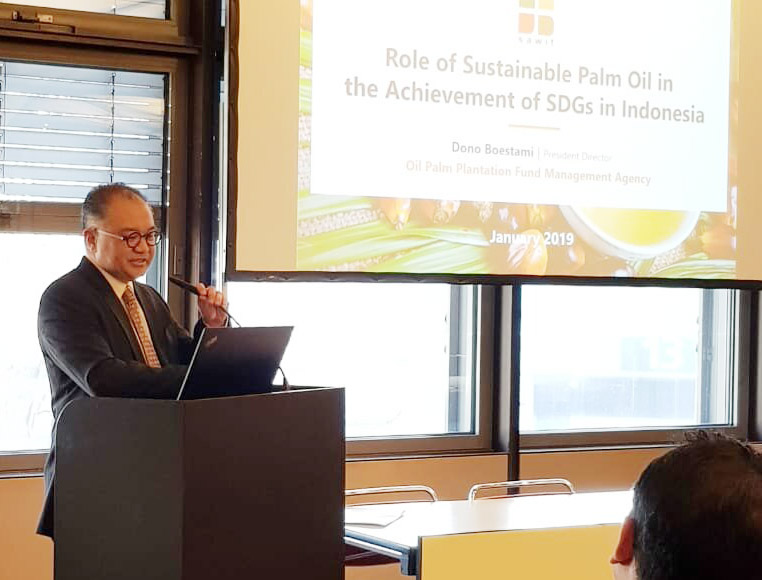
PRESIDENT Director of the Indonesian Oil Palm Plantation Fund Management Agency (BPDPKS) Dono Boestami reiterated his view that palm oil has significantly contributed to economic benefits and to UN’s Sustainable Development Goals (SDGs).
Dono’s statement came as he spoke at the Palm Oil Stakeholder Forum in the International Green Week Berlin in Berlin, Germany, (22/1/2019). “Palm oil sector has contributed to economic benefits such as economic growth, export and trade balance increase, inflation decrease, and to replace fossil-based fuel with renewable energy to increase national energy security,” Dono said.
Palm oil contribution to Indonesia trade balance is significant. In 2017, palm oil total export value reached Rp239 trillion. It was the highest national export value, more than oil and gas export. Palm oil has replaced fossil-based fuels up to 3 million kiloliters by implementing biodiesel 20% mandatory program in 2016.
Besides, its contribution to domestic economy is also significant, reached 3% of GDP; 0.63% to trade balance; 1.75% to inflation decrease; 1.74% to government expenditure, as well as has positive impact to real capital return up to 0,62%.
 Achieving SDGs
Dono also said that palm oil helps promote SDG goals, from poverty reduction to renewable energy provision. Palm oil has played a huge role in climate action and renewable energy provision. “Emission reduction as stated on Paris Agreement is a priority for Indonesia. This effort will be more difficult to achieve without direct contribution of palm oil,” Dono added.
In this respect, oil palm replanting program make it possible for palm oil plantation to increase productivity without opening new lands. Indonesia has also implemented Indonesian Sustainable Palm Oil (ISPO) and a moratorium policy on issuing new licenses to use land designated as primary forest and peatland. The moratorium should be seen as the means and breathing space to establish enabling conditions to reduce greenhouse gases emissions.
Palm oil has also provided clean energy and environmentally friendly by implementing biodiesel mandatory program since 2015. Apart from decreasing emission, the program has also created opportunity to develop palm oil conversion to bio-hydrocarbon fuels to produce green diesel, green gasoline, and green avtur. Moreover, palm oil has increased electrification ratio for more than 1.4 million households by using POME (Palm Oil Mill Effluent).
“Since August 2015 to October 2018, biodiesel mandatory program has boosted domestic biodiesel use up to 6.61 million kiloliters. This program could decrease emission by 9.88 million tons Co2e. It also brought Rp2.43 trillion in tax payment and saved US$2.77 million in foreign exchange reserves.”
Another palm oil contribution to the SDGs can also be seen in providing Decent Work and Economic Growth. As a labour intensive sector, palm oil provides jobs for million people. Recently, there are at least 16 million people work in palm oil sector. They are 12 million indirect employment and 12 million direct employment. In the plantation only, there are at least 2.4 million smallholders who can employ 4.6 million people.
In achieving SDG goal on poverty and inequalities reduction, palm oil sector has significantly reduced poverty from 60% in 1970 to only 9.82% on March 2018. It has also reduced GINI coeficient from 0.4 to 0.3 in the last three years.
Dono also said that since 2000, palm oil sector has lifted 10 million people out of poverty of which at least 1.3 million lived in rural areas. It was affected directly by palm oil expansion factor.
In order to end hunger, which is also a target of SDGs, palm oil sector has the capability to achieve food security and improved nutrition as well as to promote sustainable agriculture. “The smallholders oil palm plantation replanting program makes it possible for palm oil industry to produce more than 50 million tons of palm oil in 2025,” Dono said.
Apart from that, palm oil sector also plays a key role in childhood stunting prevention. Currently, Indonesia’s stunting rate is staggering, with 7.4 million (30%) under the age of five children are being stunted. When it comes to cooking oils, palm oil can help improve vitamin A levels in people. In 2017, 35 of 48 cooking oils from palm oil have been certified to meet vitamin A provision standard. ***
Achieving SDGs
Dono also said that palm oil helps promote SDG goals, from poverty reduction to renewable energy provision. Palm oil has played a huge role in climate action and renewable energy provision. “Emission reduction as stated on Paris Agreement is a priority for Indonesia. This effort will be more difficult to achieve without direct contribution of palm oil,” Dono added.
In this respect, oil palm replanting program make it possible for palm oil plantation to increase productivity without opening new lands. Indonesia has also implemented Indonesian Sustainable Palm Oil (ISPO) and a moratorium policy on issuing new licenses to use land designated as primary forest and peatland. The moratorium should be seen as the means and breathing space to establish enabling conditions to reduce greenhouse gases emissions.
Palm oil has also provided clean energy and environmentally friendly by implementing biodiesel mandatory program since 2015. Apart from decreasing emission, the program has also created opportunity to develop palm oil conversion to bio-hydrocarbon fuels to produce green diesel, green gasoline, and green avtur. Moreover, palm oil has increased electrification ratio for more than 1.4 million households by using POME (Palm Oil Mill Effluent).
“Since August 2015 to October 2018, biodiesel mandatory program has boosted domestic biodiesel use up to 6.61 million kiloliters. This program could decrease emission by 9.88 million tons Co2e. It also brought Rp2.43 trillion in tax payment and saved US$2.77 million in foreign exchange reserves.”
Another palm oil contribution to the SDGs can also be seen in providing Decent Work and Economic Growth. As a labour intensive sector, palm oil provides jobs for million people. Recently, there are at least 16 million people work in palm oil sector. They are 12 million indirect employment and 12 million direct employment. In the plantation only, there are at least 2.4 million smallholders who can employ 4.6 million people.
In achieving SDG goal on poverty and inequalities reduction, palm oil sector has significantly reduced poverty from 60% in 1970 to only 9.82% on March 2018. It has also reduced GINI coeficient from 0.4 to 0.3 in the last three years.
Dono also said that since 2000, palm oil sector has lifted 10 million people out of poverty of which at least 1.3 million lived in rural areas. It was affected directly by palm oil expansion factor.
In order to end hunger, which is also a target of SDGs, palm oil sector has the capability to achieve food security and improved nutrition as well as to promote sustainable agriculture. “The smallholders oil palm plantation replanting program makes it possible for palm oil industry to produce more than 50 million tons of palm oil in 2025,” Dono said.
Apart from that, palm oil sector also plays a key role in childhood stunting prevention. Currently, Indonesia’s stunting rate is staggering, with 7.4 million (30%) under the age of five children are being stunted. When it comes to cooking oils, palm oil can help improve vitamin A levels in people. In 2017, 35 of 48 cooking oils from palm oil have been certified to meet vitamin A provision standard. ***
 Achieving SDGs
Dono also said that palm oil helps promote SDG goals, from poverty reduction to renewable energy provision. Palm oil has played a huge role in climate action and renewable energy provision. “Emission reduction as stated on Paris Agreement is a priority for Indonesia. This effort will be more difficult to achieve without direct contribution of palm oil,” Dono added.
In this respect, oil palm replanting program make it possible for palm oil plantation to increase productivity without opening new lands. Indonesia has also implemented Indonesian Sustainable Palm Oil (ISPO) and a moratorium policy on issuing new licenses to use land designated as primary forest and peatland. The moratorium should be seen as the means and breathing space to establish enabling conditions to reduce greenhouse gases emissions.
Palm oil has also provided clean energy and environmentally friendly by implementing biodiesel mandatory program since 2015. Apart from decreasing emission, the program has also created opportunity to develop palm oil conversion to bio-hydrocarbon fuels to produce green diesel, green gasoline, and green avtur. Moreover, palm oil has increased electrification ratio for more than 1.4 million households by using POME (Palm Oil Mill Effluent).
“Since August 2015 to October 2018, biodiesel mandatory program has boosted domestic biodiesel use up to 6.61 million kiloliters. This program could decrease emission by 9.88 million tons Co2e. It also brought Rp2.43 trillion in tax payment and saved US$2.77 million in foreign exchange reserves.”
Another palm oil contribution to the SDGs can also be seen in providing Decent Work and Economic Growth. As a labour intensive sector, palm oil provides jobs for million people. Recently, there are at least 16 million people work in palm oil sector. They are 12 million indirect employment and 12 million direct employment. In the plantation only, there are at least 2.4 million smallholders who can employ 4.6 million people.
In achieving SDG goal on poverty and inequalities reduction, palm oil sector has significantly reduced poverty from 60% in 1970 to only 9.82% on March 2018. It has also reduced GINI coeficient from 0.4 to 0.3 in the last three years.
Dono also said that since 2000, palm oil sector has lifted 10 million people out of poverty of which at least 1.3 million lived in rural areas. It was affected directly by palm oil expansion factor.
In order to end hunger, which is also a target of SDGs, palm oil sector has the capability to achieve food security and improved nutrition as well as to promote sustainable agriculture. “The smallholders oil palm plantation replanting program makes it possible for palm oil industry to produce more than 50 million tons of palm oil in 2025,” Dono said.
Apart from that, palm oil sector also plays a key role in childhood stunting prevention. Currently, Indonesia’s stunting rate is staggering, with 7.4 million (30%) under the age of five children are being stunted. When it comes to cooking oils, palm oil can help improve vitamin A levels in people. In 2017, 35 of 48 cooking oils from palm oil have been certified to meet vitamin A provision standard. ***
Achieving SDGs
Dono also said that palm oil helps promote SDG goals, from poverty reduction to renewable energy provision. Palm oil has played a huge role in climate action and renewable energy provision. “Emission reduction as stated on Paris Agreement is a priority for Indonesia. This effort will be more difficult to achieve without direct contribution of palm oil,” Dono added.
In this respect, oil palm replanting program make it possible for palm oil plantation to increase productivity without opening new lands. Indonesia has also implemented Indonesian Sustainable Palm Oil (ISPO) and a moratorium policy on issuing new licenses to use land designated as primary forest and peatland. The moratorium should be seen as the means and breathing space to establish enabling conditions to reduce greenhouse gases emissions.
Palm oil has also provided clean energy and environmentally friendly by implementing biodiesel mandatory program since 2015. Apart from decreasing emission, the program has also created opportunity to develop palm oil conversion to bio-hydrocarbon fuels to produce green diesel, green gasoline, and green avtur. Moreover, palm oil has increased electrification ratio for more than 1.4 million households by using POME (Palm Oil Mill Effluent).
“Since August 2015 to October 2018, biodiesel mandatory program has boosted domestic biodiesel use up to 6.61 million kiloliters. This program could decrease emission by 9.88 million tons Co2e. It also brought Rp2.43 trillion in tax payment and saved US$2.77 million in foreign exchange reserves.”
Another palm oil contribution to the SDGs can also be seen in providing Decent Work and Economic Growth. As a labour intensive sector, palm oil provides jobs for million people. Recently, there are at least 16 million people work in palm oil sector. They are 12 million indirect employment and 12 million direct employment. In the plantation only, there are at least 2.4 million smallholders who can employ 4.6 million people.
In achieving SDG goal on poverty and inequalities reduction, palm oil sector has significantly reduced poverty from 60% in 1970 to only 9.82% on March 2018. It has also reduced GINI coeficient from 0.4 to 0.3 in the last three years.
Dono also said that since 2000, palm oil sector has lifted 10 million people out of poverty of which at least 1.3 million lived in rural areas. It was affected directly by palm oil expansion factor.
In order to end hunger, which is also a target of SDGs, palm oil sector has the capability to achieve food security and improved nutrition as well as to promote sustainable agriculture. “The smallholders oil palm plantation replanting program makes it possible for palm oil industry to produce more than 50 million tons of palm oil in 2025,” Dono said.
Apart from that, palm oil sector also plays a key role in childhood stunting prevention. Currently, Indonesia’s stunting rate is staggering, with 7.4 million (30%) under the age of five children are being stunted. When it comes to cooking oils, palm oil can help improve vitamin A levels in people. In 2017, 35 of 48 cooking oils from palm oil have been certified to meet vitamin A provision standard. *** 

